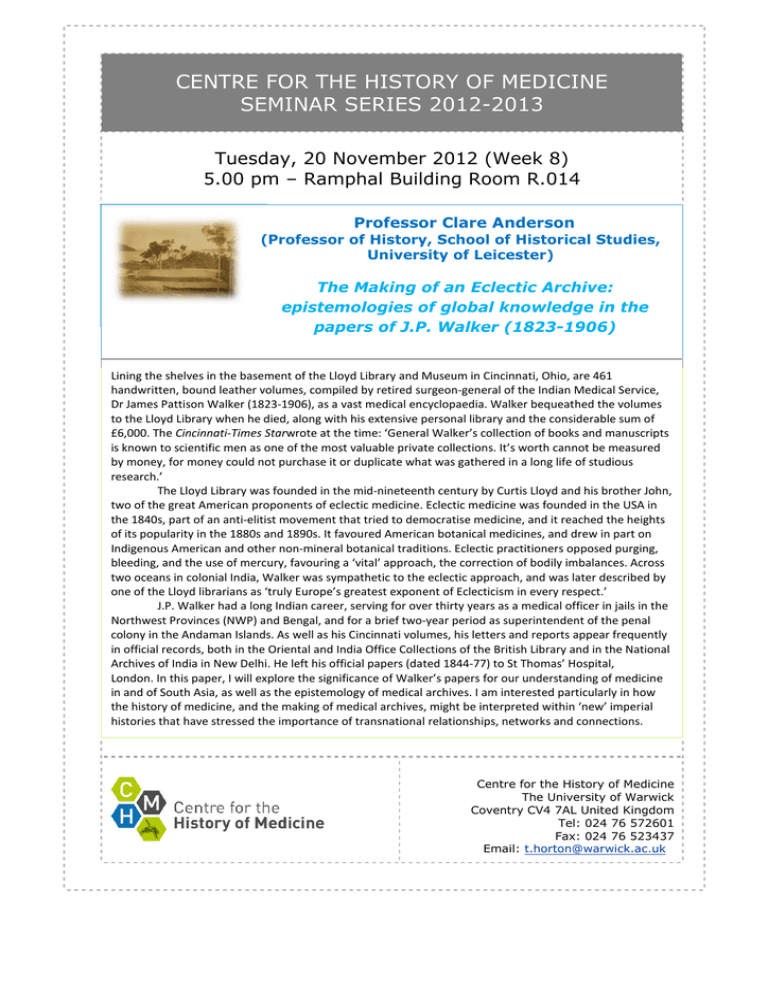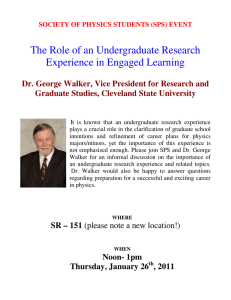CENTRE FOR THE HISTORY OF MEDICINE SEMINAR SERIES 2012-2013
advertisement

CENTRE FOR THE HISTORY OF MEDICINE SEMINAR SERIES 2012-2013 Tuesday, 20 November 2012 (Week 8) 5.00 pm – Ramphal Building Room R.014 Professor Clare Anderson (Professor of History, School of Historical Studies, University of Leicester) The Making of an Eclectic Archive: epistemologies of global knowledge in the papers of J.P. Walker (1823-1906) Lining the shelves in the basement of the Lloyd Library and Museum in Cincinnati, Ohio, are 461 handwritten, bound leather volumes, compiled by retired surgeon-general of the Indian Medical Service, Dr James Pattison Walker (1823-1906), as a vast medical encyclopaedia. Walker bequeathed the volumes to the Lloyd Library when he died, along with his extensive personal library and the considerable sum of £6,000. The Cincinnati-Times Starwrote at the time: ‘General Walker’s collection of books and manuscripts is known to scientific men as one of the most valuable private collections. It’s worth cannot be measured by money, for money could not purchase it or duplicate what was gathered in a long life of studious research.’ The Lloyd Library was founded in the mid-nineteenth century by Curtis Lloyd and his brother John, two of the great American proponents of eclectic medicine. Eclectic medicine was founded in the USA in the 1840s, part of an anti-elitist movement that tried to democratise medicine, and it reached the heights of its popularity in the 1880s and 1890s. It favoured American botanical medicines, and drew in part on Indigenous American and other non-mineral botanical traditions. Eclectic practitioners opposed purging, bleeding, and the use of mercury, favouring a ‘vital’ approach, the correction of bodily imbalances. Across two oceans in colonial India, Walker was sympathetic to the eclectic approach, and was later described by one of the Lloyd librarians as ‘truly Europe’s greatest exponent of Eclecticism in every respect.’ J.P. Walker had a long Indian career, serving for over thirty years as a medical officer in jails in the Northwest Provinces (NWP) and Bengal, and for a brief two-year period as superintendent of the penal colony in the Andaman Islands. As well as his Cincinnati volumes, his letters and reports appear frequently in official records, both in the Oriental and India Office Collections of the British Library and in the National Archives of India in New Delhi. He left his official papers (dated 1844-77) to St Thomas’ Hospital, London. In this paper, I will explore the significance of Walker’s papers for our understanding of medicine in and of South Asia, as well as the epistemology of medical archives. I am interested particularly in how the history of medicine, and the making of medical archives, might be interpreted within ‘new’ imperial histories that have stressed the importance of transnational relationships, networks and connections. Centre for the History of Medicine The University of Warwick Coventry CV4 7AL United Kingdom Tel: 024 76 572601 Fax: 024 76 523437 Email: t.horton@warwick.ac.uk


